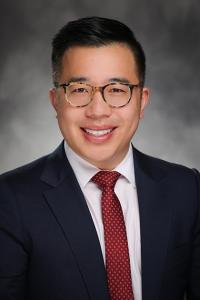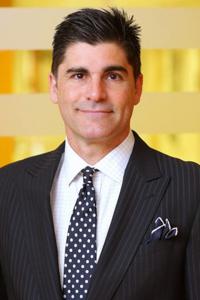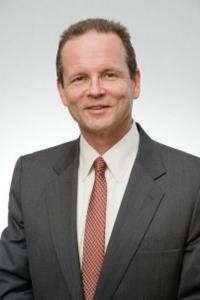Columbia Neurosurgery Imagines, Innovates, and Inspires at the 2023 Congress of Neurological Surgeons Annual Meeting in DC
This week, our team at Columbia Neurosurgery presented various topics at the 2023 Congress of Neurological Surgeons (CNS) Annual Meeting. This year's theme, Imagine, Innovate, Inspire was layered throughout our team's talks that focused on leadership, new techniques, and a review of some of the latest research continuing to push the boundaries of neurosurgery and spine care. As with AANS, the CNS Annual Meeting provides a forum for the world’s leading experts to gather, enhance health and improve lives through the advancement of neurosurgical education and scientific exchange.
Training the Next Generation
Our Chair, Dr. E. Sander Connolly, was featured on "Swimming with Sharks: Thriving in Neurosurgery Match and Residency." Dr. Connolly continues to highlight the importance mentors serve during the many moments that with shape a physician’s ultimate legacy and how to use these relationships effectively from residency through serving as a senior leader.
Dr. Nina Yoh (PGY 5) also shared on "Crafting a Narrative" to discuss the importance for neurosurgery medical students to understand their narrative and how that view can shape a vision for their future careers. The session’s attendees worked with presenters to create a brief elevator pitch narrative followed by real time feedback.
Neuro Oncology
Dr. Jeffrey Bruce presented on "Now What? Management of Intracranial Complications," where he shared insights into the general complications that may accompany intracranial tumor surgery, including brain edema, postoperative hemorrhage, wound problems, and neurological deficits.
Also, during CNS's Sunrise Science Sessions, Nina Yoh served as an Abstract Presenting Author on "BOLD asynchrony reveals tumor burden in IDH-wildtype gliomas” sharing recent findings suggesting that preoperative maps of BOLD asynchrony may be useful for guiding surgery in patients with IDH-mutated gliomas considering growing evidence advocating for their aggressive initial resection.
Facial Pain
Dr. Chris Winfree presented on the “Evaluation of Peripheral Nerve Pain” during the "Interdisciplinary Approach to Lumbar Spine and Peripheral
Nerve” and “Evolution of Peripheral Nerve Stimulation for Craniofacial Pain” during the "Update for Occipital Neuralgia.” He also served as one of the moderators for the "Managing Peripheral Nerve Complications from Common Spine, Orthopedic, and Thoracic Surgeries" course on Tuesday and additionally spoke on “Iatrogenic Nerve Injuries” during the session.
Dr. Raymond Sekula was featured during "Microvascular Decompression for Trigeminal Neuralgia and Beyond," where he shared his expertise as to who is the right candidate for a microvascular decompression (MVD) for vascular compression syndromes, including trigeminal neuralgia and other syndromes (hemifacial spasm, glossopharyngeal neuralgia, geniculate neuralgia, etc.) He also served as a panelist for "An Interdisciplinary Approach to Facial Pain," sharing best practices on a comprehensive approach to diagnosing and managing facial pain from the perspective of neurology, dentistry, and psychiatry.
Spine
Dr. Andrew Chan was invited to speak during the course, "Lateral Approaches to the Spine.” He showcased this powerful tool, which allows access to the anterior column without the need for a traditional posterior decompression or osteotomy. This provides a minimally invasive surgical option for a variety of spinal conditions, including scoliosis, deformity, degenerative disc disease, and spondylolisthesis.
Dr. Travis Stanley CreveCoeur (PGY 5) was also featured on CNS's Section on Disorders of the Spine and Peripheral Nerves: Latest Advances in Spine
Surgery, where he focused on NF2 Associated Spinal Tumors in respect to who gets surgery and responses to Bevacizumab. Which was a series in which we characterize the patients with Neurofibromatosis 2 who have spinal surgery and their outcomes. We also looked at the secondary effects that off label use of bevacizumab has on these spinal tumors and their radiographic snd clinical responses, as well as any effect on timing of spinal surgery.
Our award-winning spine research team, was represented by medical student Eunice Yang highlighting two ongoing spine research projects, "Decision Tree-based Prediction of Decompression versus Decompression and Fusion Selection in QOD Lumbar Spondylolisthesis Patients" and "Is Upper Extremity or Lower Extremity Function More Important for Patient Satisfaction? An Analysis of 24-Month Outcomes from the QOD Cervical Myelopathy Cohort". By continuing to leverage machine learning, our team can better inform clinical decision making and understand the surgical factors that lead to optimal patient outcomes.
Looking Ahead
Closing another fantastic collection of presentations and other research projects, Columbia Neurosurgery’s team is proud to embody the themes for this year’s CNS meeting and to maintain our position as a thought leader that dares to imagine solutions to the challenges we face, innovates the standard of care, and inspires the next generation of neurosurgeons.







